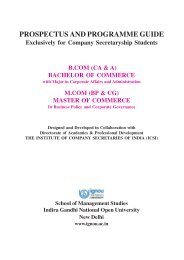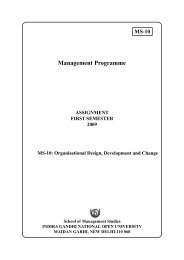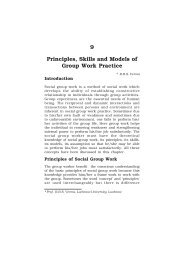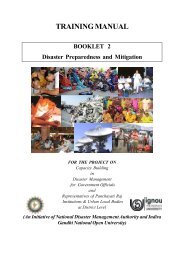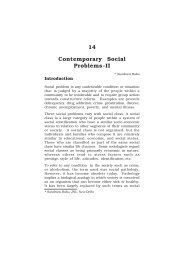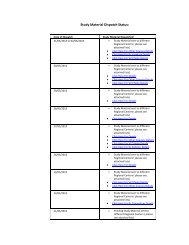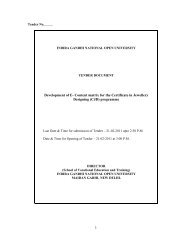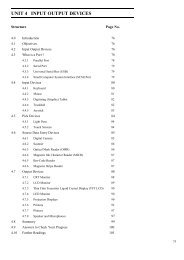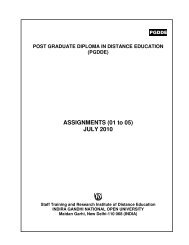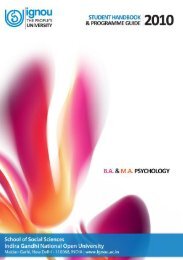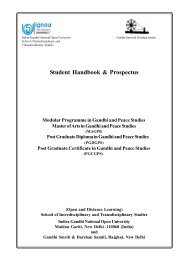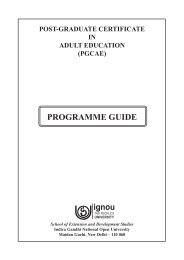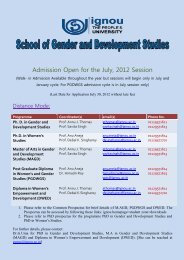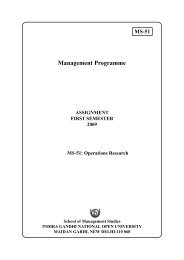Profile 2010 - IGNOU
Profile 2010 - IGNOU
Profile 2010 - IGNOU
You also want an ePaper? Increase the reach of your titles
YUMPU automatically turns print PDFs into web optimized ePapers that Google loves.
Recently, Ms. Irina Bokova, the Director<br />
General of UNESCO visited the University, and<br />
gave a silver jubilee lecture on `Building Inclusive<br />
Knowledge Societies in a Globalised World`. In her<br />
words, <strong>IGNOU</strong>, the largest university of the world, is<br />
a living embodiment of the actions required for<br />
building such societies.<br />
Authorities of the University<br />
The Visitor of the University is the President of India,<br />
and is the highest authority of the University.<br />
The Board of Management is the highest executive body<br />
of the University. It is empowered by the Statutes to look<br />
after the management and administration of the revenue,<br />
finances and property of the University as well as the<br />
conducting of all academic and administrative affairs.<br />
The Academic Council is the apex academic authority,<br />
which decides the academic policies of the University<br />
and gives directions on methods of instruction, evaluation<br />
and improvement in academic standards. It also provides<br />
guidance and supervision to research activities in the<br />
University.<br />
The Finance Committee advises the University on all<br />
financial matters, fixing the limits for the total recurring<br />
and non-recurring expenditure for the year, based on the<br />
income and resources of the University. It also examines<br />
the accounts and scrutinises the expenditure of the<br />
University.<br />
The Planning Board is responsible for the design and<br />
formulation of priorities for academic programmes offered<br />
by the University. It also has the right to advise the<br />
Board of Management and the Academic Council on any<br />
matter that it may deem necessary for the fulfilment of<br />
the objectives of the University.<br />
The Research Council is responsible for the planning,<br />
design, management, organisation and monitoring of<br />
research programmes.<br />
The Distance Education Council has been entrusted<br />
with the primary responsibility of promoting,<br />
coordinating, monitoring and determining the standards<br />
of the open learning and distance education systems in<br />
the country. It is the apex body that regulates, funds and<br />
provides infrastructural support to State Open Universities<br />
(SOUs) and Distance Education Institutes (DEIs).<br />
The Schools of Studies are the basic academic units<br />
responsible for the conceptualisation, design and<br />
development of academic programmes. Every School of<br />
Studies has a Board that oversees the academic activities<br />
of the School. The Board is chaired by the Director of<br />
the School.<br />
Officers of the University<br />
The Officers of the University include the Vice<br />
Chancellor, the Pro-Vice Chancellors, the Directors of<br />
Schools/Divisions/Centres/Institutes, the Registrars, the<br />
Finance Officer and the Librarian. The Vice Chancellor<br />
is the Chief Executive Officer of the University and is<br />
the ex-officio Chairperson of the Board of Management,<br />
the Academic Council, the Planning Board, the Research<br />
Council, the Finance Committee and the Distance<br />
Education Council.<br />
Academic Programmes<br />
At present, <strong>IGNOU</strong> offers around 350 specially needbased<br />
academic, professional, vocational, awarenessgenerating<br />
and skill-oriented programmes, leading to<br />
certificates, diplomas and degrees (bachelor`s, master`s<br />
and doctoral). The foci of the programmes are to meet<br />
the various academic and employment needs of the<br />
people, especially those of the disadvantaged sections of<br />
society. A number of programmes have been designed to<br />
meet the requirements of continuing education and<br />
training of employed people for professional growth.<br />
The academic programmes are designed and developed<br />
by the faculty in active collaboration with eminent experts<br />
from all over the country, NGOs, international<br />
organisations, and in-house instructional designers and<br />
media specialists. By providing good quality study<br />
materials (based on sound principles of instructional<br />
design) to learners, the University has succeeded in<br />
raising the standards of higher education in the country.<br />
The University, with its stress on being learner-centric,<br />
has introduced a number of modular programmes in<br />
order to provide a greater and more flexible learning<br />
environment. All academic programmes have been<br />
assigned credit weightage. In terms of study time for<br />
learners, one credit is equivalent to 30 hours of study. In<br />
general, two-year master`s degree programmes are<br />
assigned 64-72 credits, bachelor`s degree programmes<br />
10<br />
<strong>Profile</strong> <strong>2010</strong>



